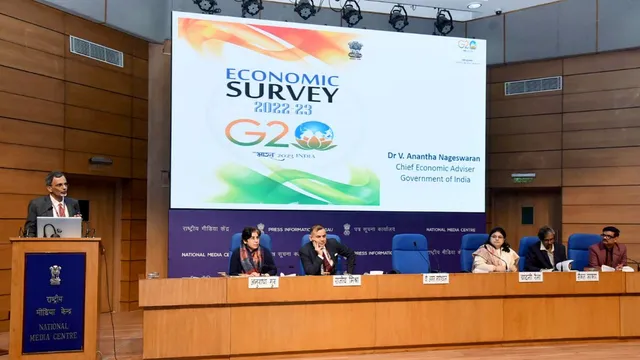- By Imran Zafar
- Sat, 20 Jul 2024 06:01 PM (IST)
- Source:JND
Finance Minister Nirmala Sitharaman will present the Economic Survey in Parliament on July 22, a day before the Union Budget. The Economic Survey, prepared by a team led by Chief Economic Adviser V Anantha Nageswaran, will provide a detailed analysis of various economic sectors and present statistical data on economic indicators such as employment, GDP growth, inflation and the budget deficit.
The Economic Survey is tabled in both houses of the Parliament during the budget session. The survey is prepared by a team led by Chief Economic under the general direction of the Economic Division of the Department of Economic Affairs (DEA) within the Union finance ministry. The final draft is reviewed and approved by the Finance Secretary and signed off by the Finance Minister.
This document serves as a comprehensive report card on the current state of the Indian economy and outlines the growth prospects ahead. It offers a thorough examination of the economy’s performance over the past year and includes projections for the short- to medium-term future.
Why is the Economic Survey presented in Parliament?
The Economic Survey is presented in Parliament to provide lawmakers, policymakers and the public with an unbiased and comprehensive analysis of the economy. It promotes transparency and informs decision-making processes regarding economic policies and strategies.
ALSO READ: 'Why NTA Untouched So Far': Congress Claims UPSC Chairman 'Nudged Out' Amid Fake Certificates Row
Economic Growth Projections
India continues to retain its position as the fastest-growing major economy. The International Monetary Fund (IMF) recently raised its economic growth forecast for India for FY25 to 7 per cent from the earlier projection of 6.8 per cent. This upward revision reflects improved private consumption prospects, particularly in rural areas.
In June, the Reserve Bank of India (RBI) revised its growth forecast for India to 7.2 per cent from 7 per cent. RBI Governor Shaktikanta Das highlighted that structural economic reforms such as the Goods and Services Tax (GST) are driving India towards an 8 per cent GDP growth trajectory on a sustained basis.
RBI Governor Shaktikanta Das noted that India’s average growth over the past three years stands at 8.3 per cent, with the projection for the current year at 7.2 per cent. He also pointed out that India contributed 18.5 per cent to global growth in the last financial year 2023-24.
(With Agency Inputs)

